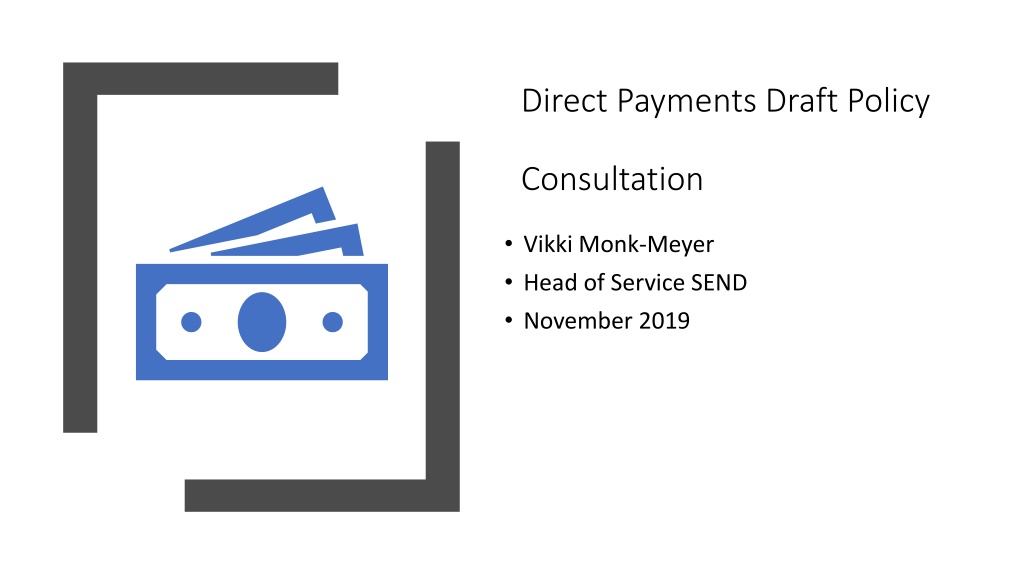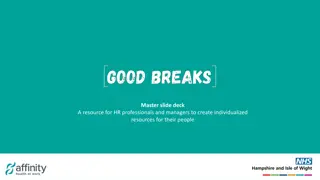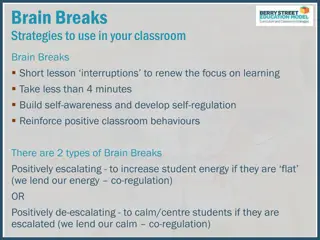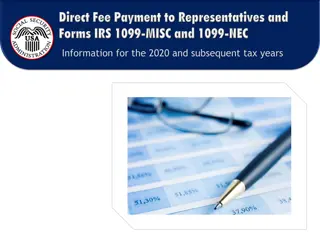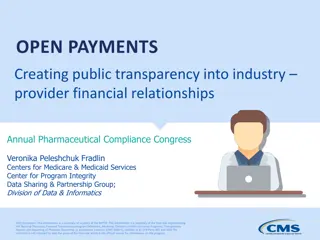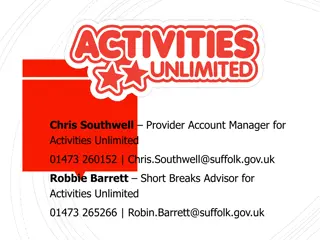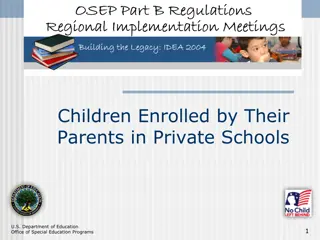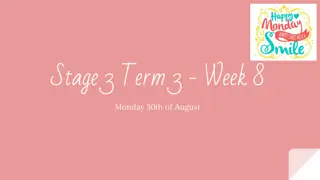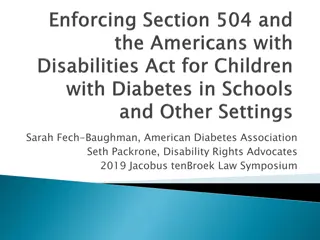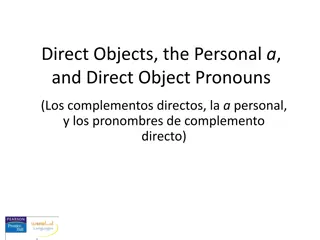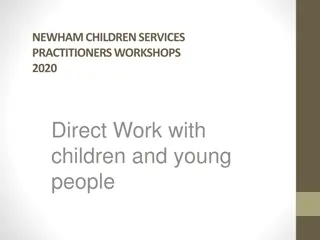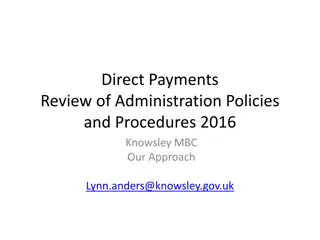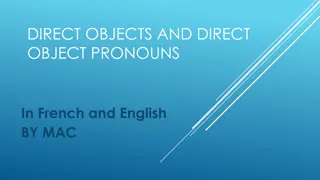Improving Direct Payments and Short Breaks Services for Children with Disabilities
Families requested a review of the direct payments policy with focus on personal budgets, transparency, decision-making timeliness, and freedom in spending. The policy was reviewed in public events, compared with neighboring boroughs, and aligned with national legislation and local practices. All children with disabilities are considered children in need, regardless of the level of disability. Short breaks aim to support families in caring for children with disabilities by providing respite and assistance in a variety of services.
Uploaded on Sep 18, 2024 | 0 Views
Download Presentation

Please find below an Image/Link to download the presentation.
The content on the website is provided AS IS for your information and personal use only. It may not be sold, licensed, or shared on other websites without obtaining consent from the author. Download presentation by click this link. If you encounter any issues during the download, it is possible that the publisher has removed the file from their server.
E N D
Presentation Transcript
Direct Payments Draft Policy Consultation Vikki Monk-Meyer Head of Service SEND November 2019
Families requested a review of the direct payments policy and practice in the Local Offer Event 2018. Areas raised were: Eligibility for personal budgets Transparency of assessment and resulting budget according to children s needs Timeliness of decision making on budgets How can the budget be spent, and how much Freedom to spend does a family have with the budget? Help with setting up the direct payment and audit and review of the direct payment When would a direct payment be stopped? Direct Payments engagement with families
6 public events with parents and representatives implementing the policy Review of draft by 2 parent reps, Designated Clinical Officer and legal department Comparison with 5 neighbouring boroughs practice in this area Review of national legislation on personal budgets for children Review of local policies on personal budgets/direct payments Also .Haringey s complaint patterns about direct payments and response to Direct Payment audits Policy changes leading to update of the short breaks statement was informed by..
All children with disabilities are children in need and there is no requirement for a child to have a particular level of disability or need any support to qualify as a child in need . What matters is that the child falls within the definition of disabled in section 17 (11) of the Children and Families Act Section 2 (4) of the Chronically Sick and Disabled Person s Act 1970 The definition is very outdated however remains in force legally and refers to mental disorders of any kind . The reference to mental disorders of any kind would then include any child with Autism, ADHD or mental health need. The implications of this is that children who may not meet the eligibility for the DCT, will still be eligible for short breaks services
What is a short break? The purpose of the short breaks are to ensure that families of children with disabilities are able to live as normal a life as possible, and assist individuals who provide care for such children to continue to do so, or to do so more effectively, by giving them breaks from caring (paraphrased from para 6 schedule 2 of the Children s Act 1989) Respite and Short Breaks can include a range of services if this enables a family to lead as normal a life as possible in the long term e.g. parenting course with child care provided This includes a duty to make provision for carers where the authority needs to: Have regards to the needs of carers who would not otherwise be able to continue to care for their child Provide breaks from caring if this allows the carer to more effectively look after the child, if the break is for education training or leisure, meet the needs of other children in the family or carry out day to day tasks needed to run the household. This is outlined in Breaks for carers of Disabled Children Regulations 2011 The type of short break required depends on the boroughs universal offer e.g. accessible parks/cinemas/swimming pools/holiday clubs
Key Issue - the proportionate impact of a child s mental health on their special educational needs can make a child eligible for respite and support Eligibility
Current Eligibility Child has a permanent and substantial disability The child is likely to receive services from the Disabled Children s Social Work team Proposed Eligibility 2 or more descriptions apply The impact of the child s needs are such, that the child has care needs which are continuing for longer than would be expected for their age There is involvement of 2 or more professionals external to the school to help support the child s development e.g. therapies, specialist teaching The child has an education health and care plan or had high top up at nursery The child is eligible for Disability Living Allowance The child attends a special school. Eligibility for Direct Payments
How will the budget be assessed and how much money will I get? Assessment
Current Assessment for the Direct Payment- Resource Allocation Low/medium/high support in each area To Be Able to Travel Safely and Use Public Transport for Children over the Age of 11 (Independence Skills) To Join in With Activities With Other Children (from age 5+) (Social Skills) To be Relaxed and Happy (Emotional Wellbeing) To Be Able to Communicate Well (Communication Skills) Be fit and Healthy To Learn the Skills I need to be as Confident and Independent as I can be. (Applicable to children over 5 years) (Independence Skills) Family Life is Good and There is Time for Everyone in the Family to enjoy life and pursue the things that matter to them (Emotional Well Being To have a Circle of Friends (Social Skills) To Be Safe At Home With Immediate Family To Be Safe In their Community Parents/ Carers get the Support they need from friends, neighbours and extended family which regularly provides them with Short Breaks (Emotional Wellbeing Parent/Carers get a good night s sleep (Physical Health/Emotional Wellbeing) Descriptors all scored at no support, some support, lots of support, exceptional support
Issues Variability in outcome occurs due to the wide range of staff using the RAS Variability due to range of budget scoring by different staff Variability occurs for more highly complex children upper end of scoring not sensitive enough for the budget the family might need RAS not sensitive for under 5 s mainly do not score RAS not sensitive if a child has complex health needs Assessment Using the Resource Allocation System (RAS) or a Child and Family Assessment Potential Solutions Have only some staff trained to implement Family Support Worker, EHC caseworkers and key workers Banding of budget provided - Families know what to expect If a budget over 3,000 is likely to be needed, always carry out a child and family assessment For under 5 s the provision of nursery places are respite, or a child and family assessment is needed Always carry out a Child and Family assessment by a social worker and with a health professional
Whats a Child and Family Assessment? Child and Family (C&F) Assessment addresses the central and most important aspects of the needs of a child / young person, and the capacity of his or her parents or care givers to respond appropriately to these needs within the wider family and community context Child s Development Child Environmental factors Parents capacity
What do other boroughs do about Direct Payments
Borough Eligibility Short Break Guarantee? How assessed Amount Personal Care only? Comparison of Boroughs Hackney Must have DLA 110 hours DLA 1,155 +/- 577 No Islington Social Care or EHC assessment 78 or 156 hours Social Care or EHC assessment 1,054 - 2,090 No Camden Health Assessment 260 hours Health Assessment 2,730 Yes + overnights Enfield Eligible for Disabled Children s Team (DCT) No (Have outreach service) Social care assessment 500 - 2,700 then assessment Yes Haringey Eligible for DCT No Resource allocation tool - school/social care/parent Top 5 offers No 100- 3,500
Proposed Budgets after Assessment Likely Budget Band 750 Some support needed to access universal services 1000 Moderate support needed to access universal services 1500 High level of support needed to access universal services 2000 Some specialist support needed 2500 Moderate levels of specialist support needed 3000 High levels of specialist support needed Over 3000 Intensive Specialist Support may be needed - Child and Family Assessment and Support Plan
Key Issues holiday flights for the child, cleaning, baby sitting Use of the Budget
Buying after school and holiday clubs What Direct Payments are currently used for Haringey Personal care Employing someone to take your child out Overnight care in or out of the home Therapies, if Whittington Health is not able to provide what is in a child s EHCP e.g. Child at school in another borough Transport, if your child has a specific health support need and services are not able to provide the support amount depends on distance from home
Holiday flights for child only Cleaning and home support Proposed new areas in the policy Small pieces of equipment Personal care, overnight and after school clubs Use of cash small amounts and description of what it can be used for - Using the money for drinks and snacks when on a trip
The Council will provide support to enable you to employ a carer to look after your child Becoming an employer carries with it certain responsibilities and obligations, in particular in relation to paying tax, national insurance, minimum wage requirements, sick pay and annual leave, and ensuring that any person employed has the right to work in the UK. A payroll agent will be provided for this service if required. Becoming an employer or employing a babysitter Families employing carers are legally obliged to sign a written contract of employment with their carers prior to employment. The contract will outline the terms and conditions of the carers work including all the statutory entitlements (e.g. maternity leave) and the job description. A babysitter is someone who looks after your child at home between 6pm and 2am The support worker is a babysitter if they look after your children for less than 3 hours a day for some payment, and this is not a long term/substantial commitment e.g. everyday vs twice a month
Audit of Direct Payments What does the annual audit entail?
Families are asked to account for how the money has been spent, and provide copies of the following information: details of all purchases/ transactions made, showing cheque numbers to aid reconciliation. What is the Annual Audit? The Direct Payments Team all monthly bank statements relating to the direct payment account. invoices and payslips if you employ a worker. receipts for any agreed purchases made using your direct payment funds. one-off agreed purchases should be made and receipts retained. A P card can be used if requested
Families may request a review of their budget is they feel it is no longer meeting their child s needs. Ideally this should be discussed as part of the education health and care plan annual review process. The review will look at: Whether a child s needs have changed Whether a child s outcomes are being met Can I ask for a review after a year? Whether there are benefits from receiving a Direct Payment How the money being paid is being managed Are appropriate records being kept Whether there has been a breach of any conditions Reviews will involve the family, support staff and anyone providing paid administrative or management support and the child.
Where money in a Direct Payment bank account is uncommitted or unaccounted for beyond an 8-week payment period, a review of the direct payment will be considered. What happens if there is money in my budget in April? Families can let the SEND department know that this it is their intention to bank the money and carry over for the next holiday period e.g. At Easter, but this must be evidenced in the yearly audit In these cases, Haringey Council will undertake a review of care and support plan with the family to ensure they are not disadvantaged. Following a review, the direct payment may be changed to ensure it still meets the needs of the family
Feedback time! Thank you
